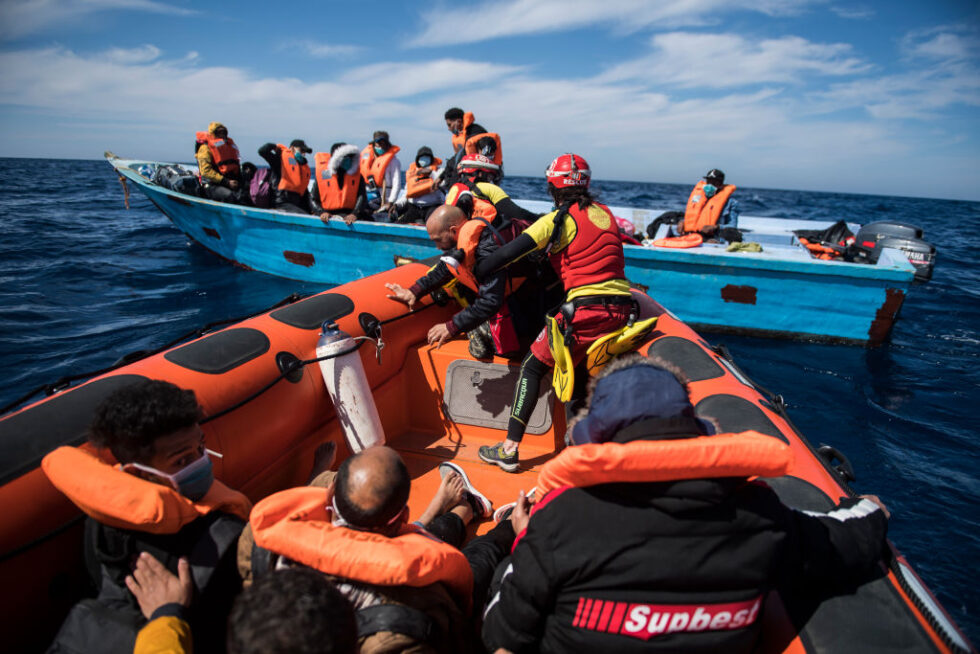
Central Mediterranean
Revealing EU role in refoulement by proxy off Libya
For a few brief months in 2017 nongovernmental organisations took the leading share of responsibility for saving the lives of asylum seekers in the central Mediterranean. Since that peak there has been an extraordinary blowback in which humanitarians have been criminalised, European resources have been poured into the Libyan coastguard and tens of thousands of interceptions at sea have prevented people seeking asylum from reaching Europe.
The role of the EU in closing the central Mediterranean has been both official and deniable. Boats, cash and training were given to militiamen to create the pretence of a national coastguard in a fragmented country but the exact role of EU and member states in managing this coastguard remains opaque. European vessels cannot return people rescued at sea to Libya because it is a patently “unsafe harbour” which makes these returns acts of non-refoulement.
So the EU and Italy created a proxy force to do what they could not do themselves without openly violating international laws: intercept unwanted migrants and return them to Libya. The strategy has relied on maintaining deniability of responsibility for Libyan coastguard operations.
METHODS
A reporting team was brought together with deep experience of the topic, as well as of reporting on the institutions and actors on both sides of the Mediterranean. A variety of tactics were deployed to penetrate the deniability over a months-long investigation that used freedom of information requests from EU agencies and institutions, confidential sources and intercepted audio recordings.
This evidence was corroborated by leaked emails from the Libyan coastguard and all the findings were placed in the context of ongoing strategic litigation from the European Court of Human Rights to submissions to the European Court of Auditors.
STORYLINES
The Mediterranean is the theatre where tensions between Europe’s ideas of human rights do battle with continental politicians’ anxiety about African migration. Until 2009, Libya was a “safe” country of return because countries such as Italy said it was. Italian vessels would intercept migrants and persuade them to clamber off their boats with promises of passage to Italy, and then put them in handcuffs and sail them to Tripoli.
A 2012 ruling at the European court of human rights changed this as judges echoed Hannah Arendt’s assertion that “refugees have the right to have rights.”
From 2017 the EU began extending surveillance flights closer to Libya as the so-called Libyan coastguard was made partially operational. Two years later, flights by the EU border agency Frontex almost doubled the size of the EU aerial mission. Under the law of the sea its pilots were bound to contact whichever ship was best placed to assist any boats in distress. But as the Libyans began asserting their presence, European flights and their coordinators started giving preference to ships that would take those they rescued southwards.
By early 2019 at EU headquarters in Brussels and at Frontex, Europe’s coastal and border guard agency, senior officials were aware that the scale of their involvement with the Libyans risked making them legally responsible for the fate of returned migrants as internal letters showed. It was becoming apparent that EU air assets – costing more than €35m in 2019 just for Frontex aircraft – had become the eyes and ears of a Libyan interception force.
A senior EU official close to Libya policy at the time described the Mediterranean strategy as a political timebomb: “The EU has taken a major reputational risk,” said the official. “We put our fate in the hands of crooks, the consequences of which are now arriving.”
To keep up to date with Lighthouse investigations sign up for our monthly newsletter
The Impact
Our investigations don’t end when we publish a story with media partners. Reaching big public audiences is an important step but these investigations have an after life which we both track and take part in. Our work can lead to swift results from court cases to resignations, it can also have a slow-burn impact from public campaigns to political debates or community actions. Where appropriate we want to be part of the conversations that investigative journalism contributes to and to make a difference on the topics we cover. Check back here in the coming months for an update on how this work is having an impact.

